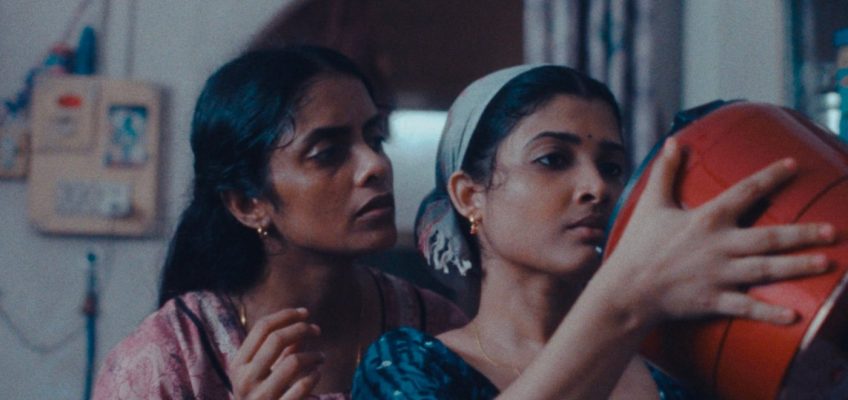Every day, the world over, we feel these things because we’re human: Longing. Peace, where we can find it. Belonging. Loneliness, sometimes. Unsteadiness in an ever-expiring present tense. If we’re city dwellers in a great urban center that feeds millions while starving millions more, we can feel desperate for an alternative because time is not limitless and “the city takes time away from you.”
Related Articles
Column: Brady Corbet’s epic movie ‘The Brutalist’ came close to crashing down more than once
‘Wicked’ and ‘Gladiator II’ make gravity-defying theater debuts
Oscars 2025: Early assumptions. True or false?
Holiday gift ideas for the movie lover, from bios and books to a status tote
Is ‘Glicked’ the new ‘Barbenheimer’? ‘Wicked’ and ‘Gladiator II’ collide in theaters Friday
That quote comes from an unnamed resident of Mumbai, one of several anonymous real-life voices heard in the opening minutes of “All We Imagine as Light.” This is sublime work, with poetry and prose in unerring balance, thanks to writer-director Payal Kapadia. It’s now in a weeklong run at the Gene Siskel Film Center.
With great praise comes inflated expectations, often the wrong ones. Kapadia’s story, about three Mumbai hospital colleagues in overlapping states of yearning, takes its time. It leaves pat resolutions to other filmmakers. You barely detect the whirr of a narrative engine here.
All the same, “All We Imagine as Light” could be described as a straightforward, keenly observed tale of three women who become better friends than they thought possible. The story begins in Mumbai, full of so many people from other places, and moves to the lush coastal region of Ratnagiri in Southwestern India, where one of these three women grew up.
First things first. At the beginning, our Mumbai entry point is officious, eagle-eyed Prabha (Kani Kusruti, a beautiful anchor for this tale) who works as a head nurse. Her younger roommate Anu (Divya Prabha, the film’s sparkplug) offers plenty of contrast. She’s impish and brazen and not good with money, a Hindu with a clandestine Muslim boyfriend (Hridhu Haroon).
Prabha has her own half-buried secret: a husband, working somewhere in Germany. They haven’t seen each other in years, and haven’t spoken in nearly two. A fancy rice cooker, arriving at the doorstep of the nurses’ Mumbai apartment one evening, is the sole tangible reminder of Prabha’s vanished arranged marriage. It’s something Anu later says she couldn’t possibly live with herself — even though religious and caste traditions have other ideas about her progressive leanings.
The hospital cook Parvaty (Chhaya Kadam), a widower, faces the most imminent crisis in “All We Imagine as Light.” The makeshift structure she calls home is about to be razed by developers whose latest Mumbai luxury condo tower, as we see later on a billboard, exemplifies the presumption that “class is a privilege. Reserved for the privileged.”
Meantime head nurse Prabha has found a suitor at work, a doctor (Azees Nedumangad, plaintive and affecting) who overcomes his innate timidity to offer Prabha a poem he wrote. In Kadapia’s small but sure ensemble of characters, this man — a stranger drastically at odds with the languages, noise and blur of Mumbai — sees in Prabha a possible romantic lifeline.
A Hindu nurse Anu (Divya Prabha, left) and her clandestine Muslim boyfriend (Hridhu Haroon) are two characters in the Mumbai-set “All We Imagine as Light.” (Janus Films/Sideshow)
Plenty happens to these people, but quietly. Kapadia lets everything breathe and flow like life, not like the kind of movies other people make. She’s drawn to difficult, elusive matters of the heart, and decisions made in between the spoken lines. Still, Kapadia, who spent part of her childhood in Mumbai, is a strong enough writer to make the lines stick. On the bus one day, Prabha opens up to Parvaty about her marital limbo, her husband in another country, intentions unknown. “When people go abroad,” Parvaty reflects, “they can lose their minds, or their memory.” By the end, all three women have gone through something significant, alone and yet together.
With a deceptively light touch, Kapadia’s film is a genuine “city symphony” ode to tantalizing, heartbreaking Mumbai, photographed by cinematographer Ramabir Das in the summer monsoon season, largely at night. The transition to the cook’s coastal village, to which Parvaty travels with her two colleagues, brings light but also a touch of existential mystery for Prabha in particular.
Das collaborated with Kapadia on the filmmaker’s previous project, a singular documentary/fiction hybrid called “A Night of Knowing Nothing.” I found that film utterly hypnotic, the peak screen experience of 2021. “All We Imagine as Light” operates far less experimentally and more as traditionally shaped story, but it too casts a spell. The soundtrack does, too, with Kapadia’s especially subtle use of “The Homeless Wanderer” by Emahoy Tsegué-Maryam Guébrou. None of the thousand or more separate strands in this mosaic scream for attention, or approval. It won’t be enough for some folks. Others, well … for others, “All We Imagine as Light” should be plenty.
“All We Imagine As Light” — 4 stars (out of 4)
No MPA rating (brief nudity and sexual material)
Running time: 1:58
How to watch: Now in theaters
Michael Phillips is a Tribune critic.


Leave a Reply